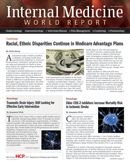Publication
Article
More Milk, Delayed Osteoarthritis?
Author(s):
The benefits of drinking milk have been established in a number of previous studies, but one group recently looked at whether there were specific benefits in helping to delay knee osteoarthritis in women.

The benefits of drinking milk have been established in a number of previous studies, but one group recently looked at whether there were specific benefits in helping to delay knee osteoarthritis in women. With an aging population and osteoarthritis becoming a growing problem healthcare professionals are looking for any help they can provide patients to prevent the painful condition from presenting itself.
The study, published in the Journal of the American Medical Association, showed that, in fact, by consuming the dairy drink, women showed better ability to avoid osteoarthritis than their male counterparts. The study observed at 1,260 women and 888 men who all had their dietary information recorded as well as x-rays to determine their joint space width. The measurements were then conducted again at 12, 24, 36, and 48 months.
From the data, the authors reported that as women increased the amount of milk intake from close to 3 glasses per week to more than 7, the average decrease of JSW also rose. Women in the study were also advised not to consume as much calcium in their diet compared to men.
As a result, the authors noted that perhaps, “women may be more sensitive for the effect of calcium intake through milk than men.” The authors also reported that the lack of JSW decrease was even more noticeable in women who ate cheese at least 7 times a week.





